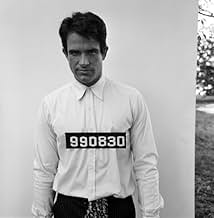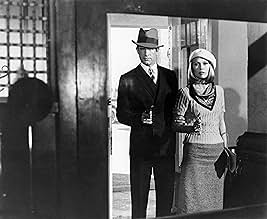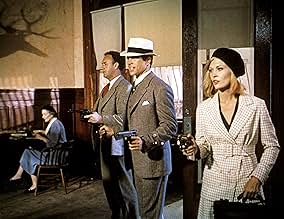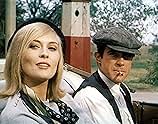Bonnie Parker, una camarera aburrida, se enamora de un exconvicto llamado Clyde Barrow. Juntos inician una ola de crímenes violentos por todo el país, robando coches y bancos.Bonnie Parker, una camarera aburrida, se enamora de un exconvicto llamado Clyde Barrow. Juntos inician una ola de crímenes violentos por todo el país, robando coches y bancos.Bonnie Parker, una camarera aburrida, se enamora de un exconvicto llamado Clyde Barrow. Juntos inician una ola de crímenes violentos por todo el país, robando coches y bancos.
- Ganó 2 premios Óscar
- 22 premios ganados y 29 nominaciones en total
Martha Adcock
- Bank Customer
- (sin créditos)
Harry Appling
- Bonnie's Uncle
- (sin créditos)
Garrett Cassell
- Cop
- (sin créditos)
Mabel Cavitt
- Bonnie's Mother
- (sin créditos)
Patrick Cranshaw
- Bank Teller
- (sin créditos)
Frances Fisher
- Bonnie's Aunt
- (sin créditos)
Sadie French
- Bank Customer
- (sin créditos)
Garry Goodgion
- Billy
- (sin créditos)
- Dirección
- Guionistas
- Todo el elenco y el equipo
- Producción, taquilla y más en IMDbPro
Argumento
¿Sabías que…?
- TriviaWhen Warren Beatty was on-board as producer only, his sister Shirley MacLaine was a strong possibility to play Bonnie. But when Beatty decided to play Clyde himself, for obvious reasons he decided not to use MacLaine.
- ErroresThe film portrays Texas Ranger Frank Hamer as a vengeful bungler who had been captured, humiliated, and released by Bonnie and Clyde. In reality, Hamer was already a legendary Texas Ranger when he was coaxed out of semi-retirement to hunt down the duo. He never met either of them until he and his posse successfully ambushed and killed them near Gibsland, Louisiana, in 1934. In 1968, Hamer's widow and son sued the movie producers for defamation of character over his portrayal and were awarded an out-of-court settlement in 1971.
- Citas
Clyde Barrow: This here's Miss Bonnie Parker. I'm Clyde Barrow. We rob banks.
- Versiones alternativasSeveral scenes (most of which can be read in the film's script) were shot but removed or altered for various reasons, either for content or to keep the running time under two hours. These scenes are, in chronological order:
- The earliest versions had Clyde shooting and killing the butcher during their fight. This was toned down to Clyde just shooting the butcher, and finally just pistol whipping him. In real life, speculation still exists as to whether Clyde Barrow actually committed the crime this is based on; although his photo was picked out, the method in which it was executed doesn't fit his MO. In the final cut, there is a brief jump in the film during the fight, where it was spliced from the original, more graphic conclusion.
- After picking up C.W., Clyde and Bonnie take him to a diner where they plan their next robbery.
- After Clyde kills Doyle Johnson (the man on the running board), Bonnie talks with CW in the bathroom while Clyde cleans his guns and laments his actions. In the bathroom CW bathes and Bonnie attempts to seduce him, but changes her mind when CW proves to be less than romantic material. A still from this scene-- Bonnie wearing a slip and Clyde's hat-- can be seen on the DVD.
- A longer scene of Buck and Blanche's approach to the motor lodge. Buck is singing Bible hymns and Blanche scolds him for bringing her to see Clyde.
- A longer version of Bonnie's visit home; she sits in the car and her sister gives her a perm (a portion of this-- Bonnie on the running board getting her hair put up-- exists in the final film).
- A very long sequence in which Bonnie and Clyde get drunk and come to terms with their impending death. They trash their room and rip out the mattress from their bed, turning it into a makeshift coffin. They then put on their best clothes and put makeup on each other so they can see what they will look like when they're dead. The scene concludes with Bonnie and Clyde dancing around CW by candlelight and chanting "The Hearse Song."
- During the Platte City raid, C.W. uses a machine gun to attack the armored car instead of grenades.
- The final shootout, in its earliest form, was done entirely with still photos shown over sounds of machine gun fire and screams, and we never actually saw Bonnie or Clyde dead. The movie ended with the two farmers running towards the car while "Foggy Mountain Breakdown" Played in the background.
- ConexionesFeatured in The 40th Annual Academy Awards (1968)
- Bandas sonorasDeep Night
Music by Charles Henderson
Lyrics by Rudy Vallee
Performed by Rudy Vallee
(heard over the opening credits)
Opinión destacada
Whether you love or hate it, Bonnie and Clyde was, and remains to this day, a ground-breaking film in the history of American cinema, and should be praised hugely for that alone. Aside from the re-defining techniques of showing violence on-screen and the depiction of main characters who are far from typical heroes, it contains career-boosting roles for many actors, and comes from a very talented director of the time, Arthur Penn.
The story follows the titular real-life bandit couple of Clyde Barrow and Bonnie Parker. The story traces them from first meeting, and follows their crime-spree throughout a Depression-era America with their gang, robbing banks, evading police and creating a notorious reputation for themselves. The film is slightly romanticised, depicting the couple as young, foolish kids who don't really seem to realise what they're getting into, but the violent and unpredictable undertone and the impressive period detail ensures an edge that lifts it above typical gangster movies, and always assures us that what's happening isn't remotely romantic, while granting the characters and events gritty depth.
Penn is on fine form from the beginning, and handles a range of different scenes with ease and a huge amount of skill, from thrilling banks-robberies and shootouts, to the more intimate character scenes, in particular those between Bonnie and Clyde, which depict one of the most interesting and unusual screen couples to date. The cinematography and editing are used to huge effect, and resulted in some of the most ground-breaking scenes of the 60's, while the folk-style soundtrack gives an air of humour.
The film tends to play a bit fast-and-loose with the facts- like condensing several real-life members of the gang into the single character C.W. Moss, and neglecting the fact that for nearly a year, Bonnie was almost unable to walk due to a car crash, but writers David Newman and Robert Benton can be forgiven for these inaccuracies considering they succeeded in crafting a story that is both thrilling and exciting as well as tragic and thought-provoking.
But the story would be nothing without first-rate cast it boasts. Warren Beatty as Clyde excels in the multi-layered, dramatic role that he had sought after for so long, and more than succeeded in his attempt to be taken seriously as an actor. Beatty's depiction of a confident, intelligent, but naive young man looking to make his name and fortune is spot-on, and while romanticised to a certain degree, is never glorified. His Clyde is more than matched by Faye Dunaway's Bonnie, who gives a hugely convincing portrayal of an everyday girl getting caught up in something she should never have become part of. The two have an excellent and very unusual chemistry, even by today's standards, and work together brilliantly as a man not used to such intimacy and a woman desperate to live the romantic life of an outlaw with him.
The supporting players may not be quite as strong as the leads, but hold their own quite well, particularly Gene Hackman as Buck. In my opinion one of the greatest actors of all time, Hackman gives a brilliant performance that's both spirited and grounded as Clyde's brother, expressing the same wide-eyed desire for the life of an outlaw as the others and maintains a hugely convincing brotherly relationship with Beatty throughout. Michael Pollard also performs well as gang member C.W, whose quiet demeanour assures his character stands out, despite being relatively small. Estelle Parsons suffers with Blanche, a supremely annoying character that personally I found too irritating. But in fairness, that's precisely the intention behind the character, and Parsons certainly manages to convey it. Throw in one of Gene Wilder's first screen performances and you have an extremely talented and interesting cast.
But aside from the great cast and direction, the truly ground-breaking, incredibly influential aspect of the film is much simpler and much more important- the depiction of on-screen violence and the impact it makes. For the first time, when people were shot or killed, it looked like it hurt. Bad. Penn and his crew pushed boundaries that before, hadn't even been considered. Suddenly, violence was being portrayed in a gritty, shocking and unsettling way. For the first time, screen violence was truly violent. This is what made the story of a group of young and naive people deciding to become criminals so powerful- the fact that we really saw what that really meant. We see what it's like to be shot, and this helps to drive home their story with such impact and power. This was the first step taken that shaped the entire future of motion-picture, and inspired other films to follow it's example, such as The Wild Bunch, and later films like MASH and Jaws that continued to push the limits of what could be done on screen.
Now, I am definitely NOT a fan of gore or extreme violence. Give me E.T and Toy Story before all the Saws and Texas Chainsaw Massacres in the world. But that doesn't mean violence in films is wrong. Violence can be a means of driving home a point, or setting a film's atmosphere, or at times it can even just be pretty damn satisfying. But whether you're a pacifist or a gore-hound, it can't be denied that violence in films is prominent, and many times it's done well, while other times it's not. This film revolutionised it. And more than that, it gave film-makers the influence to do other new things, and was the perfect film to kick-start the revolutionary era of the late 60's and 70's, and inspired them to use their own ideas rather than what would make money.
This is a very special film. Personally, not one of my favourites, but it deserves a good 8 out of 10 purely for its historical relevance and powerhouse cast. It may not be perfect, but if you haven't seen it, see it, and know that you're watching history being made.
The story follows the titular real-life bandit couple of Clyde Barrow and Bonnie Parker. The story traces them from first meeting, and follows their crime-spree throughout a Depression-era America with their gang, robbing banks, evading police and creating a notorious reputation for themselves. The film is slightly romanticised, depicting the couple as young, foolish kids who don't really seem to realise what they're getting into, but the violent and unpredictable undertone and the impressive period detail ensures an edge that lifts it above typical gangster movies, and always assures us that what's happening isn't remotely romantic, while granting the characters and events gritty depth.
Penn is on fine form from the beginning, and handles a range of different scenes with ease and a huge amount of skill, from thrilling banks-robberies and shootouts, to the more intimate character scenes, in particular those between Bonnie and Clyde, which depict one of the most interesting and unusual screen couples to date. The cinematography and editing are used to huge effect, and resulted in some of the most ground-breaking scenes of the 60's, while the folk-style soundtrack gives an air of humour.
The film tends to play a bit fast-and-loose with the facts- like condensing several real-life members of the gang into the single character C.W. Moss, and neglecting the fact that for nearly a year, Bonnie was almost unable to walk due to a car crash, but writers David Newman and Robert Benton can be forgiven for these inaccuracies considering they succeeded in crafting a story that is both thrilling and exciting as well as tragic and thought-provoking.
But the story would be nothing without first-rate cast it boasts. Warren Beatty as Clyde excels in the multi-layered, dramatic role that he had sought after for so long, and more than succeeded in his attempt to be taken seriously as an actor. Beatty's depiction of a confident, intelligent, but naive young man looking to make his name and fortune is spot-on, and while romanticised to a certain degree, is never glorified. His Clyde is more than matched by Faye Dunaway's Bonnie, who gives a hugely convincing portrayal of an everyday girl getting caught up in something she should never have become part of. The two have an excellent and very unusual chemistry, even by today's standards, and work together brilliantly as a man not used to such intimacy and a woman desperate to live the romantic life of an outlaw with him.
The supporting players may not be quite as strong as the leads, but hold their own quite well, particularly Gene Hackman as Buck. In my opinion one of the greatest actors of all time, Hackman gives a brilliant performance that's both spirited and grounded as Clyde's brother, expressing the same wide-eyed desire for the life of an outlaw as the others and maintains a hugely convincing brotherly relationship with Beatty throughout. Michael Pollard also performs well as gang member C.W, whose quiet demeanour assures his character stands out, despite being relatively small. Estelle Parsons suffers with Blanche, a supremely annoying character that personally I found too irritating. But in fairness, that's precisely the intention behind the character, and Parsons certainly manages to convey it. Throw in one of Gene Wilder's first screen performances and you have an extremely talented and interesting cast.
But aside from the great cast and direction, the truly ground-breaking, incredibly influential aspect of the film is much simpler and much more important- the depiction of on-screen violence and the impact it makes. For the first time, when people were shot or killed, it looked like it hurt. Bad. Penn and his crew pushed boundaries that before, hadn't even been considered. Suddenly, violence was being portrayed in a gritty, shocking and unsettling way. For the first time, screen violence was truly violent. This is what made the story of a group of young and naive people deciding to become criminals so powerful- the fact that we really saw what that really meant. We see what it's like to be shot, and this helps to drive home their story with such impact and power. This was the first step taken that shaped the entire future of motion-picture, and inspired other films to follow it's example, such as The Wild Bunch, and later films like MASH and Jaws that continued to push the limits of what could be done on screen.
Now, I am definitely NOT a fan of gore or extreme violence. Give me E.T and Toy Story before all the Saws and Texas Chainsaw Massacres in the world. But that doesn't mean violence in films is wrong. Violence can be a means of driving home a point, or setting a film's atmosphere, or at times it can even just be pretty damn satisfying. But whether you're a pacifist or a gore-hound, it can't be denied that violence in films is prominent, and many times it's done well, while other times it's not. This film revolutionised it. And more than that, it gave film-makers the influence to do other new things, and was the perfect film to kick-start the revolutionary era of the late 60's and 70's, and inspired them to use their own ideas rather than what would make money.
This is a very special film. Personally, not one of my favourites, but it deserves a good 8 out of 10 purely for its historical relevance and powerhouse cast. It may not be perfect, but if you haven't seen it, see it, and know that you're watching history being made.
- giggitygiggitygoo451
- 13 jul 2012
- Enlace permanente
Selecciones populares
Inicia sesión para calificar y agrega a la lista de videos para obtener recomendaciones personalizadas
Detalles
- Fecha de lanzamiento
- País de origen
- Sitio oficial
- Idioma
- También se conoce como
- Bonnie and Clyde
- Locaciones de filmación
- Red Oak, Texas, Estados Unidos(Bank Robbery)
- Productoras
- Ver más créditos de la compañía en IMDbPro
Taquilla
- Presupuesto
- USD 2,500,000 (estimado)
- Total a nivel mundial
- USD 1,475
- Tiempo de ejecución1 hora 51 minutos
- Mezcla de sonido
- Relación de aspecto
- 1.85 : 1
Contribuir a esta página
Sugiere una edición o agrega el contenido que falta

Principales brechas de datos
What is the Hindi language plot outline for Bonnie y Clyde (1967)?
Responda































